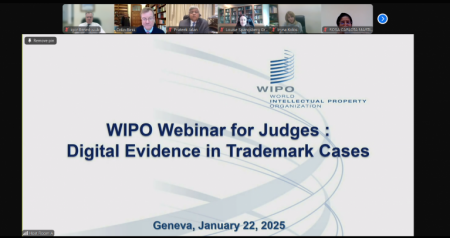Contact center of the Ukrainian Judiciary 044 207-35-46

In today's digital world, the issue of evidence in trademark disputes is becoming increasingly important. The outcome of such disputes often depends on the quality and reliability of the evidence provided. With the proliferation of online platforms and technologies, the nature of evidence is also changing significantly. Digital evidence, such as social media posts, website screenshots, analytical data and metadata, are becoming key to demonstrating the true use of a trademark, misleading consumers or proving intellectual property infringement.
In this context, the training webinar on ‘Digital Evidence in Trademark Cases’, held within the framework of the Memorandum of Cooperation between the Supreme Court of Ukraine and the World Intellectual Property Organisation (WIPO), was joined by Ihor Benedysiuk, Secretary of the Judicial Chamber for Intellectual Property Rights Protection and Antitrust and Competition Law of the Commercial Cassation Court of the Supreme Court, and judges of the CommCC of the Supreme Court Iryna Bulhakova, Tetiana Malashenkova, Iryna Kolos, Anatolii Yemets, Tetiana Zhaivoronok, as well as by Oleksii Ivanov, Head of the Specialised Chamber's Support Department.
.png)
During the event, judges from different countries shared their experience in evaluating digital evidence. Among the speakers were Prateek Jalan, Judge of the Delhi High Court (India), Louise Spangsberg Grønfeldt, Judge of the General Court of the European Union (Luxembourg), and Yan Jing, Judge of the Third Civil Division of the Supreme People's Court (China). They discussed various aspects of the use of digital evidence in court proceedings and emphasised that the development of technology is changing the way evidence is evaluated in trademark cases. Judges are increasingly faced with questions about the authenticity of website printouts, the reliability of third-party sources, and the admissibility of new digital formats such as video or social media analytics. They also talked about data verification, as the objectivity of a court decision depends on its reliability.
Particular attention was paid to the use of new technologies, such as blockchain data, time stamps, social media posts, and the role of metadata in confirming the use of a trademark. The speakers shared practical cases in which such evidence was taken into account by the courts in the course of consideration of cases.
Such training events are an important step towards improving justice in cases related to the protection of intellectual property rights. The Supreme Court, in cooperation with international organisations, continues to work on improving the digital literacy of judges to ensure efficient and modern consideration of cases in the context of technological progress.
The webinar was yet another testament to Ukraine's active integration into the international legal community and its commitment to meet the highest standards of justice.